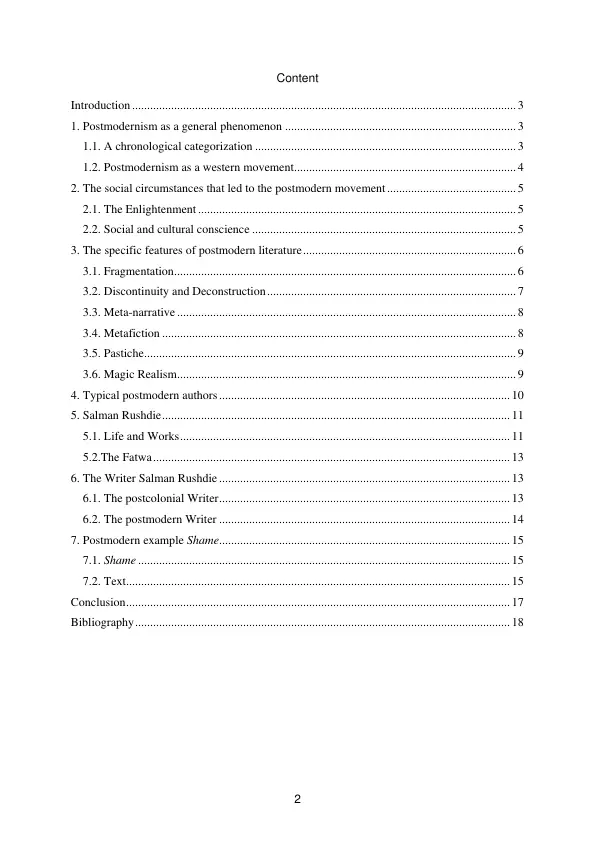This essay deals with postmodernism and its different realizations of the term in literature and about one of the most recognizable authors of this period, Salman Rushdie. First of all, we would like to give a brief overview of the history of postmodernism, whereas we see that it is rather difficult to find a clear and satisfying definition of this expression. We try to name and shortly explain the main features of postmodern literature and to inform the reader about some of the most typical authors of this period. In the second part of this essay we want to clarify the referred attributes of postmodernism with the example of Salman Rushdie whose book Shame, or at least some passages of it, will be part of a closer analysis.
Inhaltsverzeichnis (Table of Contents)
- Introduction
- Postmodernism as a general phenomenon
- A chronological categorization
- Postmodernism as a western movement
- The social circumstances that led to the postmodern movement
- The Enlightenment
- Social and cultural conscience
- The specific features of postmodern literature
- Fragmentation
- Discontinuity and Deconstruction
- Meta-narrative
- Metafiction
- Pastiche
- Magic Realism
- Typical postmodern authors
- Salman Rushdie
- Life and Works
- The Fatwa
- The Writer Salman Rushdie
- The postcolonial Writer
- The postmodern Writer
- Postmodern example Shame
- Shame
- Text
Zielsetzung und Themenschwerpunkte (Objectives and Key Themes)
This essay explores the concept of postmodernism and its manifestation in literature, focusing on the work of Salman Rushdie. The essay provides a historical overview of postmodernism, analyzing its key features and identifying prominent authors of this period. It then examines Rushdie's novel "Shame" as an example of postmodern literature, analyzing specific passages and themes within the text.
- The history and development of postmodernism
- The key features and characteristics of postmodern literature
- Salman Rushdie as a prominent postmodern author
- An analysis of "Shame" as an example of postmodern literature
- The relationship between postmodernism and social and cultural change
Zusammenfassung der Kapitel (Chapter Summaries)
The essay begins by providing a brief overview of postmodernism, highlighting its complex and multifaceted nature. It discusses the difficulty in defining postmodernism and explores its chronological categorization, tracing its roots to the movements of structuralism and post-structuralism. The essay also examines the social and cultural circumstances that contributed to the rise of postmodernism, focusing on the influence of the Enlightenment, social and cultural conscience, and the impact of globalisation.
The essay then delves into the specific features of postmodern literature, exploring concepts such as fragmentation, discontinuity, meta-narrative, and metafiction. It also examines the role of pastiche and magic realism in postmodern writing. The essay concludes by introducing Salman Rushdie as a prominent postmodern author, discussing his life, works, and the controversy surrounding "The Satanic Verses."
Schlüsselwörter (Keywords)
Postmodernism, literature, Salman Rushdie, Shame, postmodern literature, structuralism, post-structuralism, Enlightenment, globalisation, fragmentation, discontinuity, meta-narrative, metafiction, pastiche, magic realism, postcolonialism.
Frequently Asked Questions
What is the main focus of the essay "Postmodernism and Salman Rushdie"?
The essay explores the concept of postmodernism in literature, providing a historical overview and analyzing its manifestation in the works of Salman Rushdie, specifically through his novel "Shame."
Which specific literary features of postmodernism are discussed?
Key features examined include fragmentation, discontinuity, deconstruction, meta-narrative, metafiction, pastiche, and magic realism.
Does the text provide biographical information about Salman Rushdie?
Yes, the essay covers Rushdie's life and works, including a specific section on the controversy surrounding the Fatwa.
How is Salman Rushdie's novel "Shame" used in the essay?
"Shame" is used as a primary example to clarify and analyze postmodern attributes in literature through closer textual analysis of specific passages.
What social circumstances are linked to the rise of postmodernism?
The essay identifies the influence of the Enlightenment, social and cultural conscience, and the impact of globalization as contributing factors to the postmodern movement.
- Citar trabajo
- Myriam Christ (Autor), 2004, Postmodernism and Salman Rushdie, Múnich, GRIN Verlag, https://www.grin.com/document/154366



